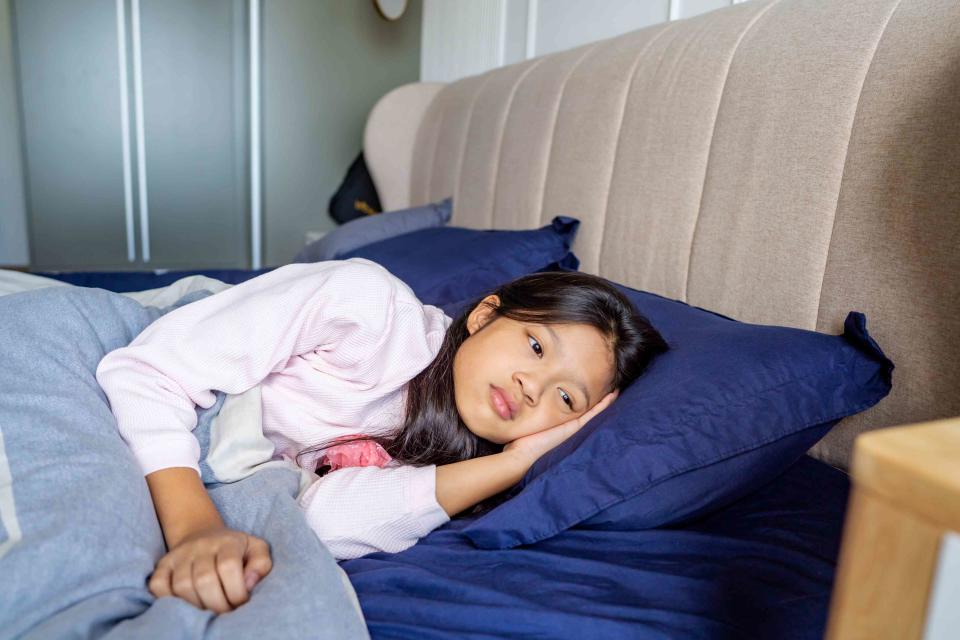This Is How Parents Decide Whether or Not To Keep Their Sick Kid Home From School
A new poll sheds light on how parents navigate their child’s need for a sick day.

GettyImages/simon2579
Fact checked by Sarah Scott
When your kid wakes up with a runny nose, a stomach ache, or nebulous complaints of not feeling good, it can be challenging to determine whether or not to send them to school. Are they really sick enough to warrant scrambling your schedule for the day to ensure last-minute child care arrangements? Or should you encourage them to tough it out so they aren’t constantly lobbying to stay home unnecessarily?
According to The C.S. Mott Children’s Hospital National Poll on Children’s Health, parents take various approaches when it’s unclear whether their child is too sick to attend school. Fifty three percent of parents responded that they are most likely to keep their child home just to be safe, 25% would send their child to school and hope for the best, and just 4% said they would call their child’s health care provider for advice.
It can be tough, especially since kids typically get multiple colds a year.
“As a parent and pediatrician, I know getting through the school season is impossible without a few coughs and colds,” says Hailey Nelson, MD, a pediatrician with Valley Children’s Healthcare. “It is practically impossible to completely avoid all these infections, leaving parents feeling a bit defenseless.”
Of course, the high cost of child care can make it hard for many parents to just keep their kids home. But that’s not the only reason for their decision.
According to the Mott poll, school attendance policies are among the factors that affect their decision-making process. Following the COVID-19 pandemic, chronic absenteeism nearly doubled, from about 15% to around 30%, between 2018 and 2022, causing many schools and districts to adopt strict attendance policies.
Among poll respondents, 91% say their kid's school has an attendance policy, and 74% think these policies are necessary to ensure kids attend school. However, 25% of parents feel the policy is hard for their children with a medical condition. And 22% say it encourages parents to send their sick kids to school, which can be problematic.
“If a kid is too sick to pay attention and complete assigned tasks, they are not learning effectively and likely setting themselves up to miss more days because they are not taking the time to recover,” says Christina Johns, MD, MEd, FAAP, senior medical advisor at PM Pediatrics. “And a sick kid at school will likely get others sick, perpetuating the problem.”
Dr. Johns warns that kids who are pushed to go to school when sick could also experience worsening symptoms that may result in an emergency department visit. Dehydration is also a risk when kids experience diarrhea, vomiting, or other symptoms that make them less likely to consume and retain liquids.
So, when should kids stay home from school? There are specific symptoms to look out for.
“Kids should be kept home from school if they are experiencing fevers of 100.4 degrees or higher, diarrhea, or vomiting,” says Dr. Nelson. “It is essential to seek help if your children's condition doesn't improve after several days or worsens.”
Consequences of Missing School
According to parents, the consequences of missing too many school days vary. Most policies focus on parents, with 63% saying there's a note or call home when a child is absent and 49% say a doctor’s note is required. However, some schools take a more student-centered approach, with 21% of parents surveyed saying that their child may have participation in school activities curtailed due to absences.
“From a mental health perspective, strict attendance policies increase the pressure for perfectionism, which can cause stress and low self-esteem,” Dr. Johns says. “We don't want kids to associate learning and education with something negative, so an attendance policy should not be punitive or guilt-provoking.”
Keep in mind, mental health issues are increasingly becoming a concern among kids. In fact, mental health concerns were a factor for at least some parents in the poll. One in five parents said they consider whether their child could use a mental health day when weighing whether or not to keep them home.
With so many possible reasons for kids to miss school, you’ll undoubtedly have to navigate the conundrum at some point throughout the school year—if not multiple times. But Dr. Nelson reminds parents that there are some steps you and your kids can take to lower the chances they will feel too crummy to make it out of the house in the morning.
“Exposure to symptomatic kids can be inevitable, so prevention is key,” she says. “Help your child avoid infection by making frequent handwashing a habit and staying current on well-child checkups and vaccinations.”
For more Parents news, make sure to sign up for our newsletter!
Read the original article on Parents.

